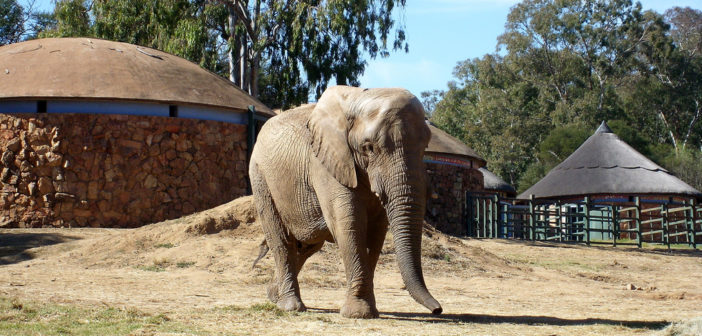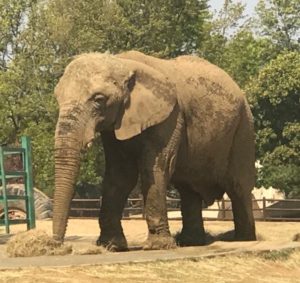Johannesburg Zoo, in Johannesburg, South Africa, refuses to consider releasing Lammie the elephant. This is despite animal welfare specialists’ renewed calls to the Johannesburg City Council to relocate the grieving elephant from the zoo to a free-roaming area after the recent death of her partner Kinkel.
The National Council of Societies for the Prevention of Cruelty to Animals (NSPCA), Ban Animal Trading, EMS Foundation and Humane Society International’s Africa chapter have all publicly rejected the zoo’s plans to introduce another elephant, as this would necessitate breaking up a bonded group with associated trauma.
Some of the above-named groups are negotiating with the zoo to have Lammie reintroduced into the wild at a reserve where a herd of previously-captive elephants roam freely. There are currently two possible locations for Lammie to go, and both have previously been successful in rewilding captive elephants. The EMS Foundation has offered to cover all the costs for Lammie’s relocation.
According to the NSPCA Wildlife Protection Unit Inspector Irinka Schröder, “The NSPCA would support this initiative,” provided all welfare concerns are adequately addressed. “What we do not support is for the zoo to break up a captive herd in order to provide Lammie with a companion and just perpetuate this issue,” Schröder says.
However the zoo says it has no intention of releasing Lammie, instead, Johannesburg Zoo General Manager Tshepang Makganye has stated that they are looking to introduce another elephant cow to the zoo. Additionally, the Zoo has not provided extra enrichment for Lammie, which they promised to do after Kinkel’s death.
A global petition to free Lammie has acquired more than 100 000 signatures and peaceful demonstrations will continue at the zoo premises, with BAN Animal Trading (BAT) stating that “there will be more protesting” in the weeks to come. BAT has also called on members of the public to join in the cause by writing to Johannesburg mayor Herman Mashaba to ask him to approve Lammie’s relocation.
Zero educational or conservation value
Makganye states that the zoo is against Lammie’s relocation because “Educating the less privileged to understand our natural heritage [is]part of saving the elephant population from being killed.” However, it is unclear how keeping one animal in captivity will save any wild elephants.
Elephant specialists, however, disagree with Makganye. “Watching a lone, depressed elephant in a barren enclosure does nothing to educate the people who do not have access to a game reserve. Keeping an elephant like Lammie in a captive zoo facility does nothing to promote South Africa as a progressive conservation authority,” says elephant specialist Dr. Marion Garaï.
Michele Pickover from the EMS Foundation agrees, saying, “It teaches people the opposite of what it means to respect wildlife. It teaches people that it is acceptable to cage wildlife for amusement.”
While there is no demonstrated conservation value to keeping captive elephants, there are notable welfare issues, including shorter life spans and higher susceptibility to diseases in captivity. According to the zoo, Kinkel had been suffering from colic for almost 10 years before dying suddenly in September this year.
Further concerns over general animal welfare at the zoo have been raised. Commenting after a demonstration this past weekend, BAT director Smaragda Louw expressed shock over the total indifference the zoo seemed to be treating animals with.
“During the four hours we were sitting in front of Lammie’s enclosure, nobody bothered to check in on her or any of the other animals in nearby enclosures. Anybody can just walk into the zoo and harass or harm the animals as they like. At eight o’clock, when the zoo had already closed to the public, no one showed up to see how Lammie was doing or check that all visitors had left.”
All of the elephants Lammie has known in her lifetime have died in captivity. Her parents, Dolly and Jumbo, were caught in the wild and moved into captivity in the 1970s, where they stayed until they died. Lammie’s brother, born in captivity, also died shortly after being sold to a zoo in France. Elephants are sentient creatures who thrive in large family structures with very strong social bonds. The death of an individual can have a large impact on elephant family members.
Read the original version of this article here.
Featured image: An elephant at Johannesburg Zoo. Image credit jonathan.mahady, CC BY-SA 3.0.






